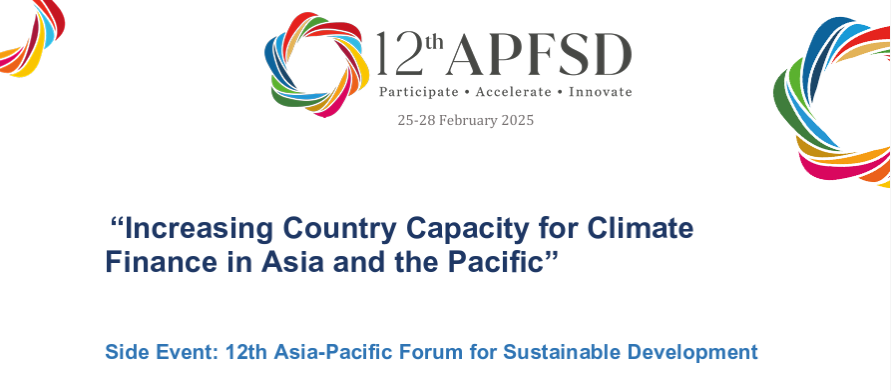
Cheng Lin, Head of the Secretariat for CASI and Director at IFS, participated in the side event “Increasing Country Capacity for Climate Finance in Asia and the Pacific,” held as part of the 12th Asia-Pacific Forum for Sustainable Development. The panel discussion, moderated by Stefan Boessner, Policy Lead and Research Fellow at the Stockholm Environment Institute’s Center for Sustainable Finance in Bangkok, brought together thought leaders to address pressing issues surrounding sustainable finance and capacity building in the region.
During the discussion, Cheng Lin shared valuable insights drawn from his extensive experience, spanning over past years, in developing sustainable finance initiatives. His journey began in 2018 with the launch of the Global Green Finance Leadership Program (GFLP), which later evolved into the Capacity-building Alliance of Sustainable Investment (CASI) in 2023. During the discussion, he highlighted key examples of successful sustainable finance initiatives and provided a thoughtful perspective on capacity building for sustainable finance:
- Localization: Capacity-building efforts must be tailored to local contexts, addressing specific policy frameworks, market conditions, community needs, and even language nuances. A one-size-fits-all approach is insufficient for addressing the unique challenges faced by nations across the Asia-Pacific region.
- Digitalization: Leveraging digital technologies is crucial for delivering customized learning content. Digital tools can enhance the accessibility, scalability, and effectiveness of capacity-building programs, ensuring that the knowledge shared is both practical and actionable.
- Diversification: To meet the varied needs of stakeholders, learning content must be diversified. This includes catering to different audiences—public and private sectors, financial and non-financial organizations—offering multiple formats, levels, and even language options to address the diverse requirements of participants.
- Close Engagement: While self-learning plays a role, personal engagement remains indispensable. In-person sessions, tutorials, and interactive discussions ensure that participants fully grasp the material and can apply it effectively.
- Assessment: To ensure knowledge retention and practical application, regular assessments such as quizzes and exams are critical. These tools help gauge progress and reinforce the ability of participants to implement sustainable finance practices in real-world scenarios.
Highlights from the Panel Discussion
The discussion tackled the urgent need for various industries to adopt more sustainable practices, including the use of green bonds and other climate finance mechanisms. Panelists explored the challenges of capacity building, particularly for small and medium enterprises (SMEs), which often face significant barriers due to limited advisory support and the complexity of navigating international regulations, such as those in the European Union.
The financial gap required to achieve sustainability goals was another focal point, with panelists pointing out that China alone would need an estimated 480 trillion RMB in investments by 2060 to meet its climate targets. The importance of nature-based climate finance solutions was also emphasized, with successful initiatives highlighted as examples of how differentiated financing strategies can be adapted to suit the capabilities and needs of individual countries.
Private sector involvement emerged as a critical area for progress. The panel called for the establishment of effective platforms to engage investors, address concerns surrounding greenwashing, and develop viable business models for transition investments. Clearer regulations and stronger management of carbon investment strategies were also proposed as essential steps to build trust and drive meaningful action.
The panel discussion concluded with actionable recommendations to accelerate climate finance strategies in the Asia-Pacific region. These include, Strengthening private sector engagement through targeted platforms and incentives; Enhancing training and advisory support, particularly for SMEs ; Addressing regulatory challenges to facilitate smoother transitions to sustainable practices.; Developing innovative financing models to support green investments.; Advancing capacity-building programs to ensure effective knowledge transfer and implementation.

